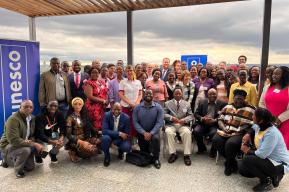News
IPBES and IPCC share Gulbenkian Prize for Humanity
The Intergovernmental Science-Policy Platform on Biodiversity and Ecosystem Services (IPBES) and the Intergovernmental Panel on Climate Change (IPCC) have been jointly awarded the 2022 Gulbenkian Prize for Humanity.
The news was announced on the morning of 13 October in Lisbon, Portugal, by Dr Angela Merkel, former Chancellor of Germany, in her capacity as President of the Gulbenkian Prize for Humanity jury. The Prize was awarded at a ceremony the same evening in Lisbon’s Grand Auditorium of the Calouste Gulbenkian Foundation.
IPBES and IPCC were selected from a field of 116 nominations from more than 40 countries. In making their selection, the jury motivated its choice by highlighting ‘the role of science on the front line of tackling climate change and the loss of biodiversity. Evidence-based science’, the jury stated, ‘has been fundamental not only to advancing many of the political and public actions but also to the need to attribute the “nature of urgency” to the ways in which the political agenda approaches the question of combatting the climate crisis’.
The prize includes an award of 1 million euros to be shared between IPBES and IPCC to advance their work.
The IPBES is to biodiversity what the IPCC is to climate change. Dr Anne Larigauderie, Executive Secretary of the IPBES in Bonn, Germany, observed that ‘the unified message from both of our expert communities is that either we tackle and solve the biodiversity crisis and the climate crisis together – or we will fail on both fronts’.
She stressed that the Gulbenkian Prize rewarded ‘the entire IPBES community: the thousands of scientists, of holders of indigenous and local knowledge, our 139 member States and the many stakeholders who have strengthened our work. This is your prize’, she said, ‘and the congratulations go to all of you’.
UNESCO was involved in the creation of IPBES and is one of its four United Nations partners, along with UNEP, the UNDP and FAO. In July 2022, IPBES published two assessments to which UNESCO contributed, one on the Sustainable Use of Wild Species and the second on Valuing Nature.
UNESCO contributes to IPBES through its vast World Network of Biosphere Reserves, which number 738 in 134 countries and cover more than 5% of the surface of the Earth.
UNESCO also hosts the IPBES Technical Support Unit on Indigenous and Local Knowledge. All IPBES assessments draw on diverse knowledge and evidence. ‘IPBES has transformed our understanding of planetary priorities’, remarks Nigel Crawhall, who runs UNESCO’s Local and Indigenous Knowledge Systems programme. ‘The combination of science and indigenous knowledge provides an historic shift in how we understand and care for our planet in all its diversity’.
This is the third year in which the prize has been awarded. In 2020, the first winner was Greta Thunberg then, in 2021, the Global Covenant of Mayors for Climate and Energy.
- Contact: m.bouamrane@unesco.org









